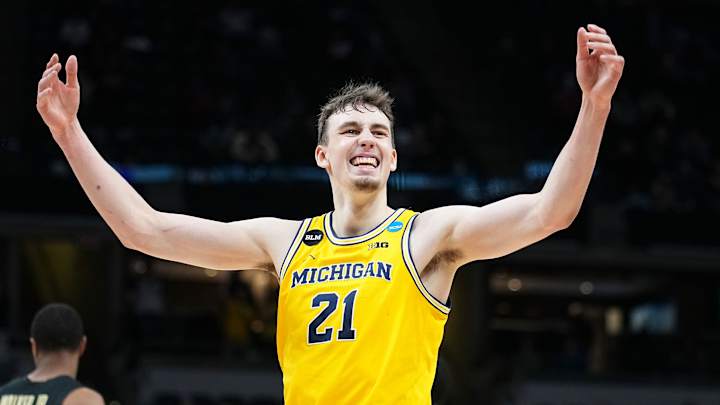Michigan Bottles Up FSU and Sends a Clear Message as It Charges On

INDIANAPOLIS — This was supposed to be the night Michigan needed Isaiah Livers. At least, one might have thought so.
The top-seeded Wolverines had the good fortune to draw two early-round opponents for whom defense was often optional. Florida State gives no such luxury. The Seminoles are one of few teams in the country with the size and discipline to tackle Michigan’s frontcourt. And the absence of Livers—the senior forward and 43% three-point shooter, reported out for the rest of the tournament shortly after Sunday’s game tipped—has meant no offensive failsafe for his team.
Instead, this was the story of Juwan Howard, his staff, and a near-perfect gameplan that put the Seminoles through a veritable gamut of discomfort. Florida State’s program is rightfully lauded for its defensive principles. Most of the talk entering the matchup centered around its size advantage, as the tallest team in the country. “We heard it all week,” Howard told reporters. “We did a really good job preparing for it.
The Seminoles’ shortest rotation player stands 6' 4”, and they like to switch actions and take advantage of their own length, to dominate space. But the downside to switching everything comes when there’s a whole lot of everything to switch. The Wolverines gave it to them, with an onslaught of tight offensive sets and composed decision-making, spearheaded by Franz Wagner and Mike Smith, that looked well-suited for a Final Four berth. Thanks to a stout defensive effort, they had blown up the game by the middle of the second half. The Wolverines closed 76 to 58, rolling to the Elite Eight with emphasis.
Facing a cavalcade of cuts and forced to defend deep into the shot clock, the Seminoles gradually crumbled, stretched into compromising positions with their size advantage all but negated. Their lengthy frontline, anchored by Barnes and Balsa Koprivica, offered little resistance and too much rim. Michigan racked up a whopping 50 of its 76 points from inside the paint. It barely felt Florida State physically.
“People get in trouble holding the ball and dribbling the whole time,” Wagner said. “Getting the ball inside and outside, moving people on defense, that’s how we got [ourselves] open.”
The common adage is that March is all about backcourt play. Michigan has it, in the perpetually underestimated Smith (eight points, four assists) and the versatile Wagner (10 points, 10 rebounds, five assists, no turnovers), who has taken on even more of a hybrid role of late. Conversely, Florida State’s lack thereof tolled the bells. RaiQuan Gray, its 6' 8”, 260-pound scorer, played just three first-half minutes after two quick fouls. He picked up his third early in the second half and took five shots the entire night. The 6’ 9" Barnes, a guard more in name than function, was called for his fourth with 15 minutes left in the game, and struggled to dictate play as a passer. Florida State finished with more turnovers than assists. Michigan clinically erased the middle of the floor, influencing their opponents away from the paint and into shots they didn’t want.
“We’re grinding man,” Howard says. “We’re doing it collectively. And it’s beautiful to see the development happening before our eyes.”
Newsflash for everyone left in the tournament—Michigan has evolved, culling an appropriate balance and flow from the pieces it has, even without its most dangerous play-finisher. The more interior-oriented Brandon Johns has stepped in comfortably for Livers. Contrary to popular guesswork, there’s been no over-reliance on 7' 1" freshman Hunter Dickinson (who still tied for the team lead with 14 points) in three tourney wins. Four Wolverines finished in double figures Sunday. Six recorded multiple assists. The three-pointer was secondary at best—they shot just 3 of 11 from distance, and it hardly mattered.
“Their spacing was unbelievable,” Florida State coach Leonard Hamilton told reporters. “They were extremely patient. We had a hard time turning them over. They really, really played off of their big guy. We spent so much time trying to defend Hunter, and they get to their perimeter shooters … when the clock would run down, they [stayed] in their system, and they executed and made plays.”
The matchup was underscored by the shared love and respect between Howard and Hamilton, dating back to the latter coaching the former with the NBA’s Washington Wizards 20 years ago. They are also two of just 12 Black head coaches in this year’s tournament, a number that points to the NCAA’s institutional disparity, not wins and losses and résumés.
Howard calls Hamilton a father figure, and counts him as a crucial figure in his rise as a coach, which will continue to Tuesday’s Elite Eight. Hamilton refers to Howard as the ultimate professional, dating back to his playing days. “He runs an excellent program, [and has] developed young men,” Howard said. “I’ve been one of the recipients of some of the development.” Their teams share principles. The respect is fully mutual.
Making the Final Four requires a certain level of self-awareness. In that way, Howard’s team mirrors its coach, a notorious over-preparer unlikely to sleep much between now and Tuesday’s game, against No. 11 UCLA. “That's a team that really, really knows who they are,” Hamilton said.
Michigan has jumped every hurdle and earned every piece of its No. 1 seed, navigated late-season morass and maintained. Livers likely won’t be back. But however this ends for the Wolverines, it won’t be because of what’s missing.
SI’s tournament newsletter analyzes everything you need to know about the Big Dance: what just happened and what’s happening next. Sign up for Morning Madness here.

Jeremy Woo has covered basketball for SI since 2014, including the NBA draft and weekly Power Rankings. He is from the South Side of Chicago.